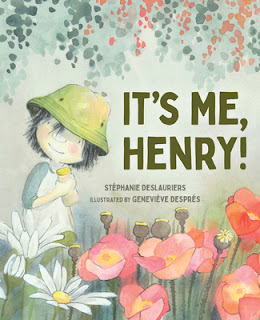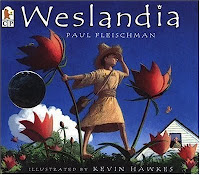I'm delighted to share a picture book that could well have appeared here a few days ago, during "Autism Awareness Month", April. The purpose of such a theme month, of course, is to increase understanding and respect for those who might be identified on the Autism spectrum. My general feeling about theme months is that they have a place in our tunnel-vision society, and yet they can too easily sort our awareness into short-term focus. I've gone on and on about that in various posts, beginning HERE. I actively chose to wait to share this book because it is such an appealing, engaging story and character. It should never be delegated to a particular topic or theme or month, but rather shared often for many purposes.
IT'S ME, HENRY! is written by Stephanie Deslauries, illustrated by Genevieve Depres, and translated by Charles Simard. 
ORCA BOOKS, CANADA, 2022
In first person narrative, readers meet Henry in his natural habitat, school, where he annoys his friend-not friend Daisy by calling her the scientific name for daisy. Henry knows himself well, but struggles to understand the feelings and reactions of others, even when he can label them correctly. He knows she doesn't like it, but can't fathom why, or adjust his behavior out of empathy. When he shouts out answers (correct ones) it earns a reminder from the teacher and expressions on the faces of peers who seem... possibly impressed by how smart he is? At recess Henry happily settles under the willow tree, alone, connecting with the tree, the earth, and nature, his favorite subjects.
When older boys tease him, he cries at being misunderstood. (Adults will recognize the irony of pain at being misunderstood in a child who misunderstands others, too, and might hurt them as a result.) Henry is shown to have a trusted adult, the counselor, and scene after scene wrapping him with flora and greenery, which also provide Henry comfort and safety. In effective daily-life scenes, readers learn about worries (and obsessions) that are displayed by some on the spectrum, but by many others as well: Yucky broccoli must NOT touch favorite nuggets on his plate.
Henry's favorite place on the planet is the garden where the end-of-year field trip takes place. Invited by his teacher to help lead the tour, Henry notices her cues for when and how to offer added facts, or even present the entire content at various locations. His enthusiasm and engaging discussions allow Daisy to connect, choosing Henry as a partner near the conclusion.
Praise from the teacher, applause form his classmates, and the feeling of solid ground beneath his feet, metaphorically, allow Henry to celebrate the day, to accept and appreciate himself. To finally feel understood. The author's choice to allow the story to unfold in Henry's voice was challenging, yet she captured the confusion and conviction of Henry. By presenting various patterns within an organic story, readers will recognize entirely typical feelings of any child in wanting to have a friend, to be accepted, and to enjoy the moments of a day without fear or worry. The other characters are realistically portrayed, too, reacting as many do, lacking a perspective on the frame of mind from which Henry is approaching them.
The illustrator very effectively leaned into the floral and greenery backgrounds on every page. She achieved a subtle, soothing, but colorful comfort zone for Henry. The effect is a blend of simple-lined elements with impressionistic aspects.
There are unlimited discussion points in this story, for anyone looking for stories with individuals on the autism spectrum and the patterns that are typical of most of the neurotypical population as well. But this story also offers plenty of opportunities to discuss friendships, diversity, bullying, and kindness. Any classroom working on studies of plants will want to add this to a collection of related picture books, too.

Candlewick, 2002
Pair this with a classic from author Paul Fleischman, illustrated by Kevin Hawkes, WESLANDIA. This story reveals an older boy, middle grade perhaps, who also loves and understands plants, knows himself well, and finds that peers and parents consider him to be weird, at best. The text and visual narratives are glorious and powerful, with a delightful twist that will have readers cheering for Wes and also taking strength from celebrating their own passions. Give them both a try.
No comments:
Post a Comment